- Release number
- No.14802
- Posted date
- 2025/6/19
- Category
-
- R&D, Production Market Report
Suntory Global Innovation Center Succeeds in Elucidating the Sex Determination System in Hops in International Joint Study with Japanese and Czech Research Institutions
― Joint research paper published in the world-renowned scientific journal "Nature Plants" ―
Download PDFTokyo, JAPAN (June 19, 2025) – Suntory Global Innovation Center Inc. (SIC), an R&D organization of Suntory Group, is proud to announce that it has successfully elucidated the sex-determining system in hops as a result of an international joint study with research institutions from Japan and the Czech Republic. The research was published as a paper entitled “Evolution and functioning of an X-A balance sex-determining system in hops” on the website of the world-renowned scientific journal "Nature Plants" on June 18, 2025.
From SIC, Eiichiro Ono and Tenta Segawa contributed to this work, which was completed in collaboration with researchers from Okayama University and Institute of Science Tokyo. The research was also done jointly with Czech research institutions, namely Hop Research Institute Co. Ltd. and the Institute of Biophysics of the Czech Academy of Sciences. Other contributors include researchers from Iwate Biotechnology Research Center, Iwate University, Kazusa DNA Research Institute, National Institute of Genetics, University of Edinburgh, and University of Toyama (listed in alphabetical order).
Research Background
Many plant species are hermaphrodite, with bisexual flowers that have both male and female reproductive organs, stamens and pistils, and can produce seeds by itself. However, Humulus lupulus (hop) of the Cannabaceae family, essential for brewing beer, and its wild relative Humulus japonicus (common name: Japanese hop), are dioecious plants with flowers that have male and female reproductive organs in separate individuals, like humans. Therefore, a single plant cannot produce offspring on its own and requires both male and female flowers (Figure 1). Notably, only the female flowers of hops are used in beer brewing (Figure 2).
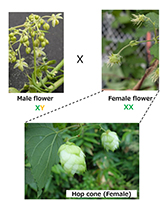 |
|
Figure 1: Wild Hops (Dioecious Humulus lupulus var. cordifolius) |
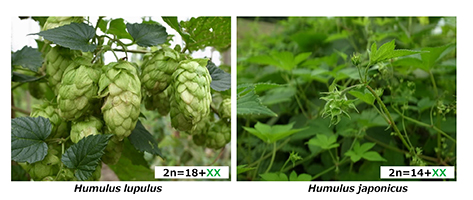 |
|
Figure 2: (left) Female flowers of Humulus lupulus, hops used in beer brewing and |
Until now, it has been known that there is an X-A balance system in the sex determination of hops. While the sex-determining genes in the X-Y system, alike human sex-determination system, are located on the Y chromosome, the sex-determining genes of the X-A balance system are expected to be located on the X chromosome. Although the SIC-led research team previously revealed the draft genome including the almost complete DNA sequence of female hops in 2014*, the detailed mechanism underlying sex determination remained unresolved due to the limitations of the analysis technology at that time and the genome information available for only one sex.
Research method
In this research, the latest genome sequence techniques were used to determine the genome sequences of both a female (Saaz cultivar) and a male hop and to construct high-quality genome sequences assembled at the chromosome level. The research also revealed the genome of the male Humulus japonicus, a wild relative of hops. To identify sex-determining genes in the X-A balance system, the research group also conducted a detailed comparison of the X and Y chromosomes of both hops (Figures 3 and 4).
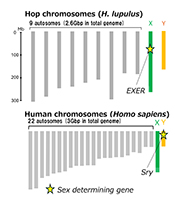 |
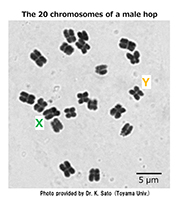 |
|
Figure 3 (left) : Illustrated chromosome maps of hop (top) and human(bottom) |
Figure 4 (right) : Chromosomes of a male hop |
Research Findings
By comparing the genome sequences of the X and Y chromosomes, the researchers identified a candidate gene similar to the ethylene receptor (EXER) in all the X chromosomes of dioecious plants of the Cannabaceae family (hop, H. japonicus, and Cannabis) and found it to be critical for sex determination. The research demonstrated that expression of this EXER gene enhances the growth of female reproductive organs while compromising the growth of male reproductive organs. Conversely, suppression of this gene results in the formation of male reproductive organs. The contrasting results confirmed that the sex of hops and other dioecious plants in the Cannabaceae family is determined by EXER (Figure 5).
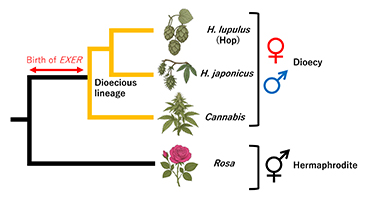 |
|
Figure 5: EXER is the sex determinant for dioecious plants of Cannabaceae |
Future Application
This study has elucidated the X-A balance system of sex determination in hops and its related dioecious plants, highlighting the further diversity of sex determination systems. Based on this research, it is expected that the development of hop varieties with superior aroma and tastes as well as growth characteristics, namely modern domesticated traits, will be accelerated. In addition, this research is expected to advance the understanding of sex systems in various organisms, beyond plants.
Established in 2013, SIC conducts research in core technologies for Suntory Group. With a mission to create value for future customers through its research, SIC will continue to actively and boldly challenge itself to pursue new customer value and further excel in the natural sciences.
Find out more about Suntory Global Innovation Center here.
*Published in 2015 (Natsume et al. The Draft Genome of Hop (Humulus lupulus), an Essence for Brewing. Plant and Cell Physiology Volume 56, Issue 3, March 2015, Pages 428–441.)
About Suntory Group
As a global leader in the beverage industry, Suntory Group aims to inspire the brilliance of life, by creating rich experiences for people, in harmony with nature. Sustained by the gifts of nature and water, the Group offers a uniquely diverse portfolio of products, from award-winning Japanese whiskies Yamazaki and Hibiki, iconic American whiskies Jim Beam and Maker's Mark, canned ready-to-drink -196 (minus one-nine-six), The Premium Malt’s beer, Japanese wine Tomi, and the world-famous Château Lagrange. Its brand collection also includes non-alcoholic favorites Orangina, Lucozade, Oasis, BOSS coffee, Suntory Tennensui water, TEA+ Oolong Tea, and V energy drink, as well as popular health and wellness product Sesamin EX.
Founded as a family-owned business in 1899 in Osaka, Japan, Suntory Group has grown into a global company operating throughout the Americas, Europe, Africa, Asia and Oceania, with an annual revenue (excluding excise taxes) of $20.3 billion in 2024. Its 41,357 employees worldwide draw upon the unique blend of Japanese artisanship and global tastes to explore new product categories and markets.
For more information, visit www.suntory.com and Drink Smart.
|
|

